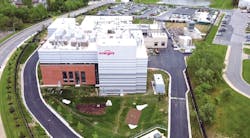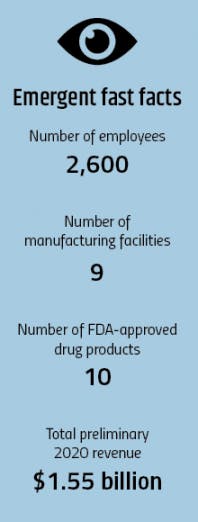It was a frigid afternoon when Sean Kirk, executive vice president of Manufacturing and Technical Operations at Emergent BioSolutions, called his manufacturing and quality staff out to a lawn at the company’s Bayview facility in Maryland to give the team a much-needed pep talk. Thanksgiving was just days away and Emergent’s staff, entrenched in the around-the-clock, breakneck effort to produce COVID-19 vaccines, was gearing up to work through the holidays.
“I told them from the heart that there are two fronts on this war against COVID,” Kirk explains. “There is the frontline where heath care workers are putting themselves at risk every day. And then the second front of this war is right here in our facility. We are the long game, and the front that is going to turn the tide of this pandemic.”
Since the production of coronavirus vaccine candidates began last spring, Emergent has been at the epicenter of the quest to end the pandemic with needed drug products. This prominent position in the pandemic war didn’t happen by chance.
For years, Emergent has strengthened its grip over the biodefense market by partnering with the U.S. government to produce biomedical countermeasures for emerging threats and prep its manufacturing facilities to spring into action if a viral outbreak hit. In 2020, that moment came and Emergent’s contract development and manufacturing (CDMO) services are now being leveraged to produce some of the industry’s leading coronavirus shots.
But Emergent is more than just a vaccine workhorse, and has for years made concerted steps to diversify its portfolio with a range of other products and services used to combat a number of deadly threats. And it’s this blend of drug development, CDMO services and government partnerships that has helped Emergent carve out a unique niche in the pharma manufacturing space.
The backstory
Originally founded as Michigan-based BioPort in 1998, Emergent began with just one product in its portfolio, but it was something the U.S. desperately needed: an anthrax vaccine. Today, BioThrax, which the U.S. government purchases for the Strategic National Stockpile, remains the only anthrax vaccine approved by the U.S. Food and Drug Administration.
Since this original contract, Emergent’s ties with the government have helped grow its clout in biodefense.
In 2009, Emergent embarked on a multimillion-dollar renovation project at its Bayview plant in Baltimore, Maryland. A few years later, the Biomedical Advanced Research and Development Authority (BARDA) came knocking to see if the facility could be used to increase the country’s manufacturing capacity for pandemic-response vaccines and therapeutics. As part of a 25-year contract, BARDA ultimately co-funded the expansion, which doubled the facility’s footprint and made it one of three manufacturing facilities designated by the government to provide a range of medical countermeasures. In 2020, a task order to utilize the plant went into effect along with a $480 million contract to make J&J’s vaccine and a $261 million contract to produce AstraZeneca’s vaccine.
Growth through M&A
Emergent has also strategized mergers and acquisitions to pad its portfolio and help develop the company’s current four segments: vaccines, devices, therapeutics and CDMO.
For example, in 2013, Emergent agreed to purchase Cangene Corporation, adding its portfolio of biodefense products and notably, a hyperimmune platform Emergent says has become the basis for its modular manufacturing unit in development.
In 2017, the company scooped up a smallpox vaccine from Sanofi Pasteur, which two years later, won a $2.8 billion purchasing agreement from the U.S. government.
Emergent also began tackling the opioid epidemic in 2018 by acquiring Adapt Pharma, which manufactured Narcan, a commonly used opioid-overdose antidote nasal spray.
All told, Emergent’s offerings now also include commercialized vaccines for cholera and typhoid, an auto-injector platform for nerve agent antidotes, and a reactive skin decontamination lotion kit. Its pipeline similarly reads like a list of supplies you’d want during an apocalypse with therapeutics in the works for Zika and influenza, vaccines for other various exotic viruses, and more.
Emergent also has its own plasma-derived coronavirus therapeutics in development — one human-based that has entered late-stage trials — and one that’s horse-based.
The COVID response
According to Kirk, Emergent’s CDMO was already a “strategic pillar of growth” for the company. Now, with the ramping up of vaccine production, that growth has accelerated.
Prior to the pandemic, Emergent’s CDMO business accounted for about 10 percent of its revenue — but in 2020, it grew to one-third. And in its third-quarter earnings statement this year, the company reported a record-setting performance of $972.4 million in total revenues.
To meet this demand, Kirk says the company is hiring for a variety of opportunities and has on-boarded around 800 employees in the last year — nearly 40 percent of which are directly related to the vaccine production ramp-up.
Kirk says that the level of tech collaboration between Emergent and the U.S. government has played a big role in helping the company secure needed raw materials and equipment to increase its manufacturing capabilities.
“What would normally take three years, we’ve done in seven months,” he says.
Emergent has also leveraged single-use platforms in four suites of its Bayview facility to meet the large production demands.
“I suspect that our leveraging of single-use bioreactors for the vaccines we’re making has never been done on this scale,” Kirk says.
Going forward, Kirk says that Emergent is planning to keep its growth momentum by utilizing a multi-pronged strategy that will focus on executing on its core business, expanding through M&A, strengthening R&D, building scalable capabilities for its enterprise systems and investing in cell and gene viral vector manufacturing.
Kirk is also quick to give a shout-out to his team and emphasizes that its “organizational culture” has always been a prime focus for the company.
“We played a role in Ebola. We played a role in Zika. But our employees weren’t really known,” Kirk explains. “I believe that our role in the COVID response is going to get these people the acknowledgement they deserve.”

